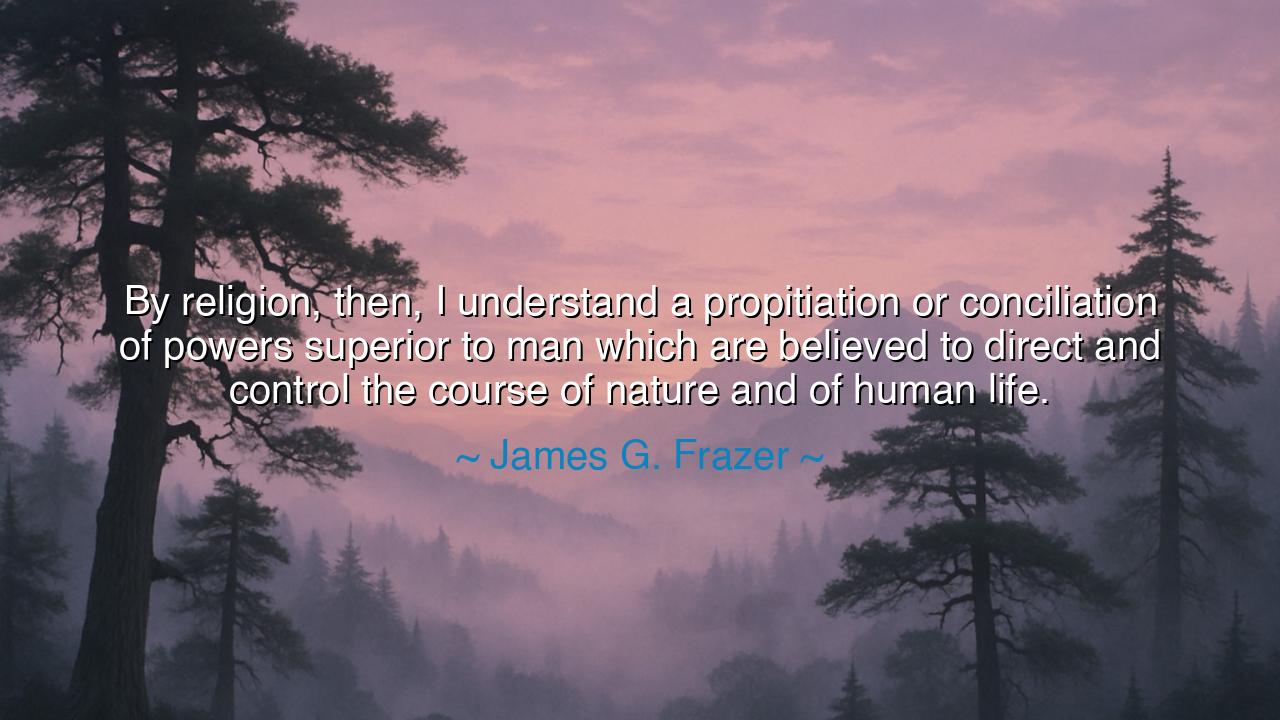
By religion, then, I understand a propitiation or conciliation of
By religion, then, I understand a propitiation or conciliation of powers superior to man which are believed to direct and control the course of nature and of human life.






In the journey of humanity, few forces have had as profound an impact on the course of history as religion. As James G. Frazer wisely notes, "By religion, then, I understand a propitiation or conciliation of powers superior to man which are believed to direct and control the course of nature and of human life." This profound statement captures the essence of religion: the belief in forces beyond human control that govern the natural world and human fate. To the ancients, religion was not just a set of rituals or beliefs—it was a vital means by which people sought to align themselves with the divine forces they believed shaped their lives and the world around them. Religion became a bridge between humanity and the unseen, a way to seek favor, understanding, and guidance from forces believed to govern the cosmos.
From the earliest days of recorded history, humans have turned to religion as a means of explaining the mysteries of nature and existence. In ancient Egypt, the pharaohs were seen not only as political rulers but as divine intermediaries between the gods and the people. The Egyptians believed that their rulers were appointed by the gods to maintain order in the universe—Ma'at—and to ensure the fertility of the land, the rise of the Nile, and the prosperity of the people. Rituals and sacrifices were offered to propitiate the gods, seeking their favor to direct the course of nature and safeguard the future. The ancients understood that by aligning with the divine order, they could find harmony in both the natural world and their lives.
Similarly, the Greeks and Romans looked to the gods to explain and control the forces of nature. The ancient Greeks, with their pantheon of gods—Zeus, Apollo, Athena, and others—believed that the gods ruled over every aspect of existence, from the weather to love, to war, and even fate itself. The gods were often seen as forces that needed to be propitiated through ritual and sacrifice in order to secure divine favor and ensure success in their endeavors. The famous tale of King Agamemnon in the Iliad, who sacrifices his daughter to Artemis to ensure favorable winds for his fleet, speaks to the lengths the ancient Greeks were willing to go to in order to conciliate the gods and secure their assistance in matters of life and death.
In Judaism, the idea of a covenant between humanity and the divine is central to the faith. The story of Abraham's willingness to sacrifice his son Isaac in obedience to God illustrates the ancient belief in the need to appease or conciliate the divine in order to secure favor. In this context, religion becomes not only a means of seeking divine intervention but also a way of understanding fate and destiny. God is seen as the ultimate authority who directs the course of events, and faith and obedience are the means by which one seeks to align with divine will.
This idea of religion as a means to influence or direct the course of life is not confined to ancient times. Even in modern societies, people turn to spirituality for comfort, guidance, and meaning. The prayers and rituals performed by those facing challenges, whether personal or societal, are rooted in the same desire to find peace and understanding in a world that often seems unpredictable and uncontrollable. In times of hardship, people seek solace in their belief that there are forces greater than themselves, forces that might intervene on their behalf or offer wisdom to help navigate life's challenges.
The lesson from Frazer's reflection is clear: religion has always been a vehicle for understanding the mysteries of life, for aligning oneself with forces greater than oneself, and for seeking peace amidst the chaos of existence. By recognizing the role that faith plays in shaping human experience, we come to understand the depth of religion's influence. It teaches us that, though we may never fully understand the forces that shape our lives, we can seek to understand and align ourselves with them through faith, ritual, and respect for the natural world and the spiritual realm.
In our own lives, we can follow Frazer's insight by recognizing the profound role that spirituality plays in shaping not only our individual experience but also the larger course of human history. Whether we are religious or secular, there is wisdom to be found in acknowledging that we are part of something greater, something beyond the visible and the material. Let us propitiate the forces that guide us through our actions, words, and thoughts, seeking to live in harmony with the world around us. By doing so, we can navigate life with greater understanding and purpose, drawing on the wisdom of the ancients and the timeless truths that still guide us today.






AAdministratorAdministrator
Welcome, honored guests. Please leave a comment, we will respond soon